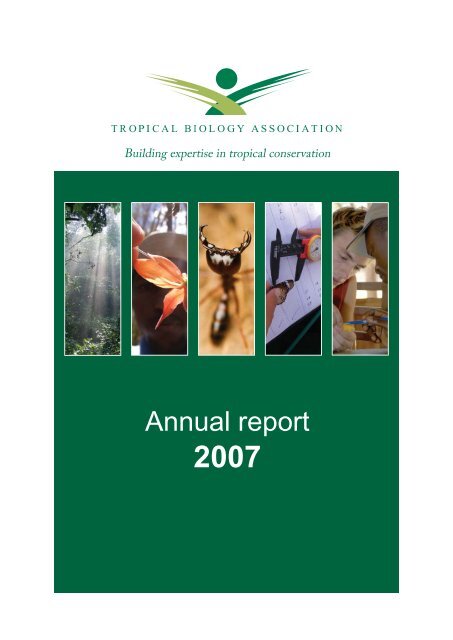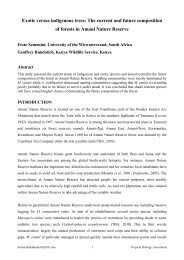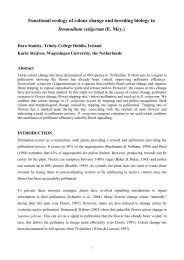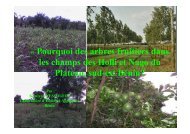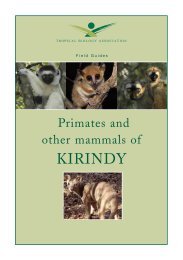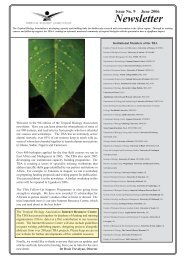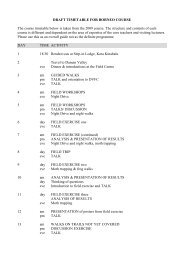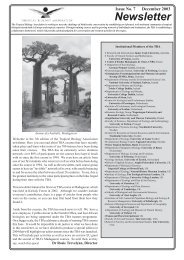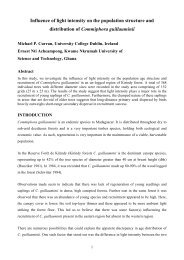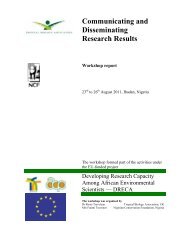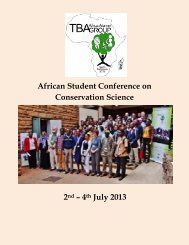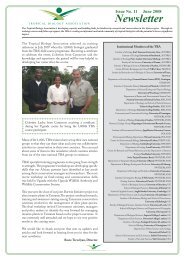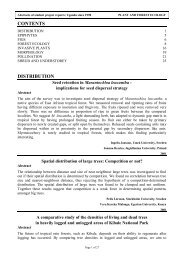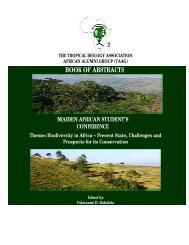Annual report - Tropical Biology Association
Annual report - Tropical Biology Association
Annual report - Tropical Biology Association
Create successful ePaper yourself
Turn your PDF publications into a flip-book with our unique Google optimized e-Paper software.
Building expertise in tropical conservation<strong>Annual</strong> <strong>report</strong>2007
<strong>Tropical</strong> <strong>Biology</strong> <strong>Association</strong>ContentsThe <strong>Tropical</strong> <strong>Biology</strong> <strong>Association</strong> 3Summary of fi eld courses 2006 5Specialist training 7Follow-up support 8TBA MSc scholarships 9Building research capacity 10Resources & network 11TBA elsewhere 122
<strong>Annual</strong> <strong>report</strong> 2007The <strong>Tropical</strong> <strong>Biology</strong> <strong>Association</strong>working in partnership to build expertise in tropicalconservationThe <strong>Tropical</strong> <strong>Biology</strong> <strong>Association</strong> (TBA)is a non-governmental organisation thatbuilds expertise in tropical ecology andconservation in partnership with Africaninstitutions.TBA partnershipsPartnerships with governmental and nongovernmentalorganisations are a crucialway of ensuring training activities fill theskills gaps and create joint ownership ofthe activities.TBA portfolioTrainingResearch capacity cityResourcesInternational field coursesSpecialist skills workshopsFollow-up supportCreating north-south collaborationsBuilding research expertiseTraining manualsInternet Resource CentreNetworkIn 13 years, TBA has carried out 41 month-long field courses and 5 specialisttraining workshops. In total, 1100 conservation biologists from 220 institutionsin 49 different countries have been trained.3
<strong>Tropical</strong> <strong>Biology</strong> <strong>Association</strong>summary of 2006International field coursesThe 2006 field courses trained 92conservation biologists from 17 Africancountries, 13 European countries, Australia,Brazil and India. Demand was high withover 480 individuals applying to attend. Thecourses took place in Tanzania, Uganda,Kenya and Madagascar.Specialist skills workshopsThe third in a series of workshops onfundraising and scientific writing washeld at Makerere University, Uganda.The 19 participants were conservationscientists working for governmental andnon-governmental organizations. Theworkshop aimed to increase the capabilityof Ugandan institutions to raise fundsfor priority conservation activities andto raise awareness among civil society and decision makers. In Tanzania, a newseries of workshops was launched on theecology and management of alien invasiveplants.Launching the TBA trainingmanualsThe TBA training manuals on scientificwriting and fundraising were publishedin 2006. Designed as tools for teachers inAfrica as well as accompaniments to theworkshops, the manuals are being sent toTBA’s African partners and are available onthe TBA website.Internet Resource CentreTBA launched an internet database offunding sources and career opportunitiesfor African conservation scientists in 2006.The database is the largest and most up todate of its kind and has already attractedover 600 registered users.“In the time Ihave knownTBA, I haveseen it go fromstrength tostrength, a smallorganization witha large impact.”UK courseteacher4
<strong>Annual</strong> <strong>report</strong> 2007Summary of field courses20062006 brought the total number of TBAfield course trainees to 985. Held inTanzania, Uganda, Kenya and Madagascar,the courses taught up to date techniquesin tropical ecology and conservation tobiologists from Africa and Europe.In Tanzania, the course was held incollaboration with the Amani NatureReserve. Much of the teaching was basedaround the ‘hot’ topics of the UsambaraMountains such as forest fragmentation,the management of alien species, andthe diverse amphibian fauna. Participantswere given first hand experiences ofmanagement issues through trips toa community forest reserve and a sitedegraded by alluvial gold mining.The course in Uganda was held at KibaleForest in collaboration with MakerereUniversity, with a four-day excursionto Queen Elizabeth National Park. Thesites gave the students a good overallunderstanding of both savanna and forestecology and the impact of contrastingtypes of human-wildlife conflicts.After a year’s interlude, TBA returnedto Kenya in 2006. Core teaching wascarried out entirely by 4 national teachers,with a focus on savanna ecology andpark management. The course includeda day’s workshop held at the KenyaWildlife Service Training Institute thataddressed a wide range of conservationtopics.Held in Kirindy Forest, Madagascar,the final course of the year focused onone of the most threatened biomes of theworld; dry deciduous forests. Pollination,ant, butterfly, botany and primate expertswere present on the course to give avaried and lively introduction to this typeof forest. Towards the end of the coursethere was a two-day excursion to Perinetand Mantadia rainforest to give studentsan opportunity to experience contrastingtypes of forest.“The course waswithout doubtan invaluableaddition to myundergraduatelearning: theTBA provideda breadthof teachingexpertisethat a singleinstitution wouldbe unlikely tomatch.”Tanzanianparticipant 06/45
<strong>Tropical</strong> <strong>Biology</strong> <strong>Association</strong>“Theinternationalnature of thecourse providedan excellentlearningenvironment forthe participants.They learnedfrom instructorsas well as fromeach other. Itwas a superopportunity forall involved.”Teacher 06/2Countries represented in2006AfricaBeninBurundiCameroonEthiopiaGhanaKenyaMadagascarMalawiNigeriaRwandaSierra LeoneSouth AfricaSudanTanzaniaUgandaZambiaZimbabweEurope/OtherAustraliaAustriaBrazilDenmarkFranceGermanyGreeceIndiaIrelandItalyPortugalSlovakiaSwedenSwitzerlandThe NetherlandsUK6
<strong>Annual</strong> <strong>report</strong> 2007Specialist trainingThe Specialist Training Programmeis developing the capacity of Africaninstitutions through tailor made coursesin specific skills. Individuals who take partin the programme are equipped with thenecessary resources and expertise to becometrainers themselves back at their homeinstitutions. To date, there have been a totalof 61 workshop trainees from Tanzania,Kenya, Uganda and Ghana.Specialist Skills workshop 2006in Uganda: scientific writing andfundraisingThe third in the series of specialistworkshops was held at Makerere Universityin partnership with the Faculty of Forestryand Nature Conservation. It taught practicalskills in writing scientific papers andgrant proposals and giving effectivepresentations. The 19 participants wereconservation scientists and park ecologistsworking for governmental and nongovernmentalorganisations throughoutUganda.“Such workshops should continue. I am going to starthelping friends and my institution to review their <strong>report</strong>sand proposals, and intend to publish my work too.”Ugandan STP participant7
<strong>Tropical</strong> <strong>Biology</strong> <strong>Association</strong>Follow-up supportThe Follow-up Support Programmeassists African alumni apply new skills andachieve their career objectives after theirTBA course.The programme keeps TBA alumniinformed of job opportunities and sourcesof project funding as well as providing themwith scholarships and subscriptions toconservation societies. It is also an effectiveway that alumni with relevant skills andexperience can be recruited to collaboratewith institutions and individuals.What are TBA alumni doing now?Out of the 985 TBA field course alumni,over 79% are in regular contact with theTBA office. There is a 100% contact ratewith all alumni of the past three years.The majority of TBA alumni are workingin the field of biodiversity research orconservation.“I want to thank TBA for all their support as I have now been awarded a Sauve Scholarship toattend McGill University in Montreal. This would not have been possible without the referencesand advice I received from you.”Philip Osano, Kenyan alumnusAfricanEuropeanConservation/biology/research57%Other 3%Lecturer/teachingassistant 10%PhD/Postdoc11%Conservation/biology/research71%Other 1%Lecturer/teachingassistant 10%PhD/Postdoc17%MSc 18%MSc 8%8
<strong>Annual</strong> <strong>report</strong> 2007TBA MSc scholarshipsThe TBA MSc scholarships provideAfrican alumni with the vital chance tocontinue their education and launch themfurther along their career trajectories.Twelve Africans have finished their studiesunder this programme and six of these arecontinuing with PhD studies.In 2006, TBA awarded two scholarshipsto alumni to study in universities in SouthAfrica and Madagascar. Another Africanalumnus was supported through fundsraised by his fellow course colleagues fromthe 2003 Tanzanian course. Additionally,TBA collaborates with Amani NatureReserve and the Centre for Ecology andHydrology on a Darwin Initiative projectthat funds two Tanzanian MSc studentsstudying invasive plants in the EastUsambaras.Current status of recipients of the TBA MSc scholarshipsYear Beneficiary Nationality University2002 Mark Otieno* Kenya Kenyatta, Kenya2003 Susan Sangiru Imbahale Kenya Nairobi, KenyaMao Angua Amis Uganda Cape Town, South AfricaPhilip Molo McOsano Kenya Cape Town, South AfricaGeoffrey Soka Tanzania Cape Town, South AfricaMohammed El Tahir SirElkhatim Sudan Khartoum, SudanKowiyou Yessoufou Benin Abomey-Calavi, Benin2004 Nivohary Sylviane Maria Volampeno Madagascar Oxford Brookes, UKTerence Suinyuy* Cameroon Cape Town, South AfricaMudde Barnabus Uganda Makerere University, UgandaRonald Kakeeto Uganda Makerere University, Uganda2005 Alex Wilbard Kisingo* Tanzania Reading, UKRaymond Killenga* Tanzania Sokoine, TanzaniaKwaku Aduse-Poku Ghana KNUST, GhanaEtotepe Aikpemi Sogbohossou* Benin Abomey-Calavi, BeninMartin Mwema Kenya Cape Town, South AfricaJohn Richard Tanzania Sokoine, TanzaniaEzekiel Edward Tanzania Sokoine, Tanzania2006 Josia Razafindramanana Madagascar Antananarivo, MadagascarHassan Babiker Sudan Cape Town, South AfricaSimon Musila Kenya Kenyatta, Kenya* Completed studies/waiting to graduate9
<strong>Tropical</strong> <strong>Biology</strong> <strong>Association</strong>Building research capacityDarwin Initiative project on invasive plantsTBA is collaborating with the Centre ofEcology and Hydrology (UK) and AmaniNature Reserve on a four-year research andtraining project on invasive plant species inthe East Usambara Mountains, Tanzania.An important outcome of the project willbe to assist Tanzania to apply the guidingprinciples for prevention, introduction andmitigation of impacts of invasive alienplants.Workshop on the ecology andmanagement of alien invasiveplants speciesThe first workshop in this series trained15 Tanzanians in practical approaches tounderstanding and studying the ecologyand monitoring of alien invasive plants intropical forest ecosystems. An importantfeature of the workshops series is thatfollow-up grants are made available toparticipants to enable them to put theirnew ideas and skills into practice beforethe next workshop. One grant beneficiaryhas produced a poster to create awarenessof invasive alien plants among Tanzanianresource managers whilst another isinvestigating the use of an invasive agroforestrytree by farmers living around theAmani Nature Reserve.10
<strong>Annual</strong> <strong>report</strong> 2007Resources & networkcreating links and providing training manualsTBA skill seriesThe TBA launched its skill series in 2006to assist trainers in Africa become moreeffective in their work. The first two in theseries are: Scientific writing and publishingresults and Fundraising guidelines. These arebeing sent to TBA’s African partners andare now available on the TBA website.TBA field guidesDeveloped as guides that can be taken intothe field to help trainees explore the ecologyof the TBA course sites, the first three werepublished in 2006: Common birds of Kirindy,Primates and other mammals of Kirindy, andAmani Nature Reserve, an introduction.Internet Resource CentreThe funding database is an online directoryof grants and funding opportunitiesrelevant to biologists working in Africa.It is probably the largest and most up todate database of its kind and already hasover 600 registered users. TBA has alsodeveloped an online bulletin board thatposts current job opportunities, one-offscholarships, conferences, fellowships andnews in the conservation field.TBA national groupsTBA alumni have got together to formtheir own groups in their home countries.These associations were set up toencourage African conservation scientiststo share research and conservation ideasand promote collaborations. There arecurrently TBA associations in Cameroon,Ghana, Sudan, Nigeria and Kenya. Othersare being planned in Ethiopia, Malawi andTanzania.11
<strong>Tropical</strong> <strong>Biology</strong> <strong>Association</strong>TBA elsewhereWorkshop in IndiaIn February 2006, the TBA joined forceswith an Indian non-goverernmetalorganisation, Aaranyak, to trainconservation scientists from the northeast states of India. Entitled ‘ConservationBeyond Boundaries’, the trainingprogramme was a chance for TBA toshare its field teaching experience and helpdevelop similar courses in India.The Hotspots projectTBA is part of a consortium oforganisations led by the Royal BotanicGardens in Kew working together totrain biologists focusing on the world’sbiodiversity hotspots. The TBA role isto carry out field training and so far hashosted two ‘hotspots PhD students on ourfield courses; a further seven will attendTBA courses in 2007.Student Conference onConservation Science 2006TBA is a co-organiser of this exciting threedayconference based at the Department ofZoology in Cambridge. There was a largeattendance of TBA alumni at the 2006conference where 5 alumni presented theirwork. In all, 17 alumni attended fromCameroon, Denmark, Sudan, Belgium,England, South Africa, Poland, Tanzania,Madagascar, Switzerland, Spain, Uganda,Ireland, and Kenya.12
<strong>Annual</strong> <strong>report</strong> 2007Member institutionsThe <strong>Tropical</strong> <strong>Biology</strong> <strong>Association</strong> has a subscribing membership of 42 universities, research departments and conservation institutions thatform the basis of its governing council. For details on how to join the TBA please contact us.Faculty of Natural Sciences and Mathematics, University of Vienna, AustriaInstitute of Ecology, University of Innsbruck, AustriaInstitute of Zoology, Karl-Franzens University, AustriaInstitute of Zoology, Paris-Lodron University, AustriaInstitute of Biological Sciences, University of Aarhus, DenmarkCentre d’Études Biologiques de Chizé, CNRS, FranceInstitut de Recherches sur la Biologie de l’Insecte, University of Tours, FranceDepartment of Sociobiology, German Primate Centre, GermanyForstzoologisches Institut, University of Freiburg, GermanyInstitute of Systematic Botany, University of Munich, GermanyDepartment of Zoology and School of Natural Sciences, Trinity College Dublin, IrelandEnvironmental Science Unit, National University of Ireland, IrelandDepartment of Botany, National University of Ireland, IrelandDepartment of Zoology, University College Dublin, IrelandCentre for Ecological and Evolutionary Studies, University of Groningen, NetherlandsInstitute of <strong>Biology</strong>, University of Leiden, NetherlandsResource Ecology Group, Wageningen University and Research Centre, NetherlandsInstitute of Environmental Sciences, Jagiellonian University, PolandEnvironmental <strong>Biology</strong> Department, Warsaw University, PolandDepartments of Zoology and Anthropology, University of Lisbon, PortugalCenter for Research and Natural Resources, & Department of Systems Ecology, Stockholm University, SwedenDepartment of Ecology, Lund University, SwedenDepartment of <strong>Biology</strong>, Göteborg University, SwedenSwiss <strong>Tropical</strong> Institute, Basel, SwitzerlandDepartment of <strong>Biology</strong>, Ecology and Evolution, University of Fribourg, SwitzerlandZoology Institute, University of Zurich, SwitzerlandDepartment of Integrative <strong>Biology</strong>, University of Basel, SwitzerlandDepartment of <strong>Biology</strong>, University College London, UKSchool of Biological Sciences, University of Aberdeen, UKSchool of Biological Sciences, University of Bristol, UKDepartments of Plant Sciences and Zoology, University of Cambridge, UKDepartment of Biological Sciences, Imperial College at Silwood Park, UKInstitute of Evolutionary <strong>Biology</strong>, University of Edinburgh, UKSchool of Geosciences, University of Edinburgh, UKInstitute of Zoology, Zoological Society of London, UKFaculty of Biological Sciences Graduate School, University of Leeds, UKSchool of Applied Sciences, Anglia Ruskin University, UKSchool of Biological Sciences and Department of Geography, University of Liverpool, UKDepartment of Zoology, The Natural History Museum, UKDepartment of Zoology, University of Oxford, UKSchool of <strong>Biology</strong>, University of Nottingham, UKFaculty of Arts and Sciences, Yale University, USA13
<strong>Tropical</strong> <strong>Biology</strong> <strong>Association</strong>AcknowledgementsTBA is supported by the EuropeanCommission (B7-6200/01/0370/ENV),the BAT Biodiversity Partnership, theBritish Ecological Society, the Ben VoyseyScholarship Fund.The TBA thanks the British HighCommission in Kenya and Uganda, andthe Department of Zoology in Cambridgefor their continuing collaboration andsupport. The TBA is grateful to all it’spartners, teachers, and field station staff forhard work and enthusiasm in making the2006 field courses and specialist workshopssuch a success.TBA is grateful for all photos taken by staffand students we have used in this <strong>report</strong>.TBA thanks its partner organizationsThe National Museums of KenyaNature Kenya, KenyaEgerton University, KenyaKenya Wildlife Service, KenyaMakerere University Institute of Environment and Natural Resources,UgandaMakerere University Biological Field Station, UgandaNature Uganda, UgandaAmani Nature Reserve, TanzaniaTanzania Forestry Research Institute, TanzaniaForestry and Beekeeping Division of the Ministry of Natural Resourcesand Tourism, TanzaniaFaculty of Sciences, University of Antananarivo, MadagascarMinistre Eaux et Forêts and Ministre de l’Environnement, MadagascarCentre de Formation Professionalle Forestière, MadagascarGerman Primate Centre, MadagascarTHE BAT BIOVERSITY PARTNERSHIPDepartment of ZoologyThe EU CommissionB7-6200/01/0370/ENV14
<strong>Annual</strong> <strong>report</strong> 2007“TBA training plays a vital role in ensuring that future generationsappreciate and protect their surroundings, I now have the opportunity totransfer skills and knowledge to others and be part of this process.”Rwandan field course participant15
European Officetba@tropical-biology.orgThe <strong>Tropical</strong> <strong>Biology</strong> <strong>Association</strong>Department of ZoologyDowning StreetCambridgeCB2 3EJUnited KingdomTel./Fax + 44 (0)1223 336619African Officetba-africa@tropical-biology.orgThe <strong>Tropical</strong> <strong>Biology</strong> <strong>Association</strong>PO BOX 4448600100 - NairobiKenyaTel. +254 (0) 20 3749957 / 3746090Fax. +254 (0) 20 3741049www.tropical-biology.org


